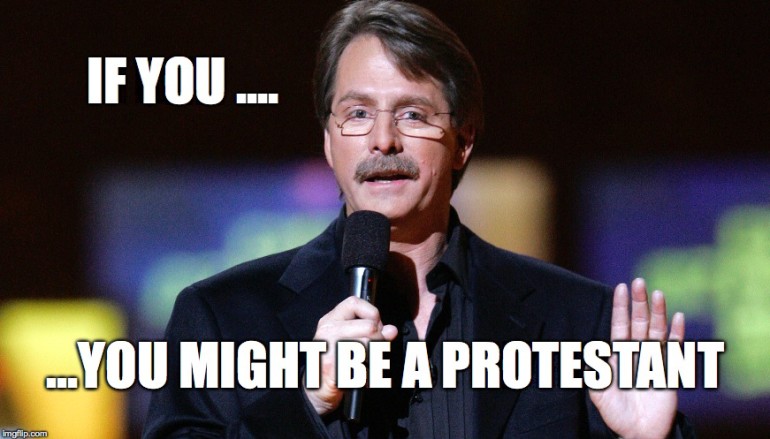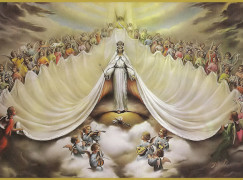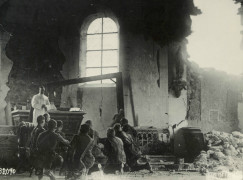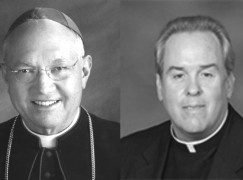

Right vs. Left? Or, Catholic vs. Protestant?
The very effective modern tactic of the devil is actually the very ancient military strategy of “divide and conquer.” This strategy is defined as one that separates a force that would be stronger if united. The devil is roaming around like a lion that sizes up the herd to find the easiest target. He is also watching to see who is separated from the herd. Large, coordinated forces are difficult to defeat. If the enemy can separate us into small units or individuals, he can more easily defeat each one.
Deal Hudson does a fine job (here) highlighting some of the most notorious claims of self-professed Catholics. In actuality, claims such as these are not just “differing opinions” within Catholicism, but are reasons to say one is no longer Catholic at all. People are free to make these claims, but they are not free to claim that one can remain Catholic while holding them. These are “protests” against what the Church teaches and, therefore, those who stand on these claims are, ipso facto, Protestants.
St. Thomas Aquinas once wrote: “It is requisite for the relaxation of the mind that we make use, from time to time, of playful deeds and jokes.” I highlight some of these claims (found in Hudson’s article) with a bit of humor … using Jeff Foxworthy’s classic comedy routine: “You might be a redneck.”
If you believe … “There’s no such thing as absolute truth. What’s true for you may not be true for me” … you might be a Protestant.
People use this argument a lot when they disagree with a statement and have no other way to support their idea. After all, if nothing is true for everyone, then they can believe whatever they want and there’s nothing you can say to make them change their minds.
But look at that statement again: “There’s no such thing as absolute truth.” Isn’t that, in itself, a statement that’s being made absolutely? In other words, it applies some rule or standard to everyone across the board — exactly what the relativists say is impossible. They have undone their own argument simply by stating their case.
The other problem with this statement is that no relativist actually believes it. If someone said to you, “There is no absolute truth,” and you punched him in the stomach, he’d probably get upset. But by his own creed, he’d have to accept that while punching someone in the stomach may be wrong for him, it might not be wrong for you.
This is when they’ll come back with an amendment to the original statement by saying, “As long as you’re not hurting others, you’re free to do and believe what you like.” But this is an arbitrary distinction (as well as another absolute statement). Who says I can’t hurt others? What constitutes “hurt”? Where does this rule come from?
If this statement is made based on personal preference, it means nothing for anyone else. “Do no harm” is in itself an appeal to something greater — a sort of universal dignity for the human person. But again, the question is where does this dignity come from?
As you can see, the further you delve into these questions, the closer you come to understanding that our concepts of right and truth are not arbitrary but are based in some greater, universal truth outside ourselves — a truth written in the very nature of our being. We may not know it in its entirety, but it can’t be denied that this truth exists.
If you believe … “I don’t need to go to Church. As long as I’m a good person, that’s all that really matters” … you might be a Protestant.
This argument is used often, and is pretty disingenuous. When someone says he’s a “good person,” what he really means is that he’s “not a bad person” — bad people being those who murder, rape, and steal. Most people don’t have to extend a lot of effort to avoid these sins, and that’s the idea: We want to do the least amount of work necessary just to get us by. Not very Christ-like, is it?
But that mentality aside, there’s a much more important reason why Catholics go to Church other than just as an exercise in going the extra mile. Mass is the cornerstone of our faith life because of what lies at its heart: the Eucharist. It’s the source of all life for Catholics, who believe that bread and wine become the real body and blood of Christ. It’s not just a symbol of God, but God made physically present to us in a way we don’t experience through prayer alone.
Jesus said, “Truly, truly, I say to you, unless you eat the flesh of the Son of man and drink his blood, you have no life in you; he who eats my flesh and drinks my blood has eternal life, and I will raise him up at the last day” (John 6:53-54). We’re honoring Jesus’ command and trusting in that promise every time we go to Mass.
What’s more, the Eucharist — along with all the other Sacraments — is only available to those in the Church. As members of the Church, Christ’s visible body here on earth, our lives are intimately tied up with the lives of others in that Church. Our personal relationship with God is vital, but we also have a responsibility to live as faithful members of Christ’s body. Just being a “good person” isn’t enough.
If you believe … “You don’t need to confess your sins to a priest. You can go straight to God” … you might be a Protestant.
As a former Baptist minister, I can understand the Protestant objection to confession (they have a different understanding of priesthood). But for a Catholic to say something like this…it’s disappointing. I suspect that, human nature being what it is, people just don’t like telling other people their sins, and so they come up with justifications for not doing so.
The Sacrament of Confession has been with us from the beginning, coming from the words of Christ Himself:
“Jesus said to them again, ‘Peace be with you. As the Father has sent me, even so I send you.’ And when he had said this, he breathed on them, and said to them, ‘Receive the Holy Spirit. If you forgive the sins of any, they are forgiven; if you retain the sins of any, they are retained.” (John 20:21-23)
Notice that Jesus gives His apostles the power to forgive sins. Of course, they wouldn’t know which sins to forgive if they weren’t told what sins were involved.
The practice of confession is also evident in the Letter Of James:
“Is any among you sick? Let him call for the elders of the church, and let them pray over him, anointing him with oil in the name of the Lord; and the prayer of faith will save the sick man, and the Lord will raise him up; and if he has committed sins, he will be forgiven. Therefore confess your sins to one another, and pray for one another, that you may be healed.” (James 5:14-16)
It’s interesting that nowhere does James (or Jesus) tell us to confess our sins to God alone. Rather, they seem to think that forgiveness comes through some means of public confession.
And it’s not difficult to understand why. You see, when we sin, we rupture our relationship not just with God, but with His Body, the Church (since all Catholics are interconnected as children of a common Father). So when we apologize, we need to do so to all parties involved — God and the Church.
Think of it this way. Imagine you walk into a store and steal some of their merchandise. Later, you feel remorse and regret the sinful act. Now, you can pray to God to forgive you for breaking His commandment. But there’s still another party involved; you’ll need to return the merchandise and make restitution for your action.
It’s the same way with the Church. In the confessional, the priest represents God and the Church, since we’ve sinned against both. And when he pronounces the words of absolution, our forgiveness is complete.
If you believe … “Dissent is actually a positive thing, since we should all keep our minds open to new ideas” … you might be a Protestant.
You might hear this argument a lot today, especially in the wake of the abuse scandal in the Church. Everyone wants to find a solution to the problem, and in doing so some people are advocating ideas that are outside the pale of our Catholic faith (i.e., women priests, being open to homosexuality, etc). A lot of people blame the Church for being too rigid in its beliefs and not wanting to try anything new.
The truth is, a lot of the ideas for reform that are floating around today aren’t new. They’ve been around for a while, and the Church has already considered them. In fact, the Church has spent its entire life carefully examining ideas and determining which ones are in line with God’s law and which aren’t. It has discarded heresy after heresy while carefully building up the tenets of the Faith. It should come as no surprise that there are thousands of other Christian churches in existence today — all of them had “new ideas” at one point that the Church had decided were outside the deposit of faith.
The Church has an important responsibility in protecting the integrity of our Faith. It never rejects ideas out of hand, as some dissenters would claim, but has two thousand years of prayer and study behind the beliefs it holds to be true.
This doesn’t mean that we can never disagree on anything. There’s always room to discuss how best to deepen our understanding of the truth — for example, how we can improve our seminaries or clergy/lay interactions — all within the guidelines of our Faith.
If you believe … “Properly interpreted, the Bible does not condemn homosexuality. Rather, it weighs against promiscuity — whether homosexual or heterosexual. Therefore, we have no reason to oppose loving homosexual relationships” … you might be a Protestant.
As homosexual activity gains greater acceptance in our culture, there’ll be more pressure among Christians to explain away the Bible’s clear prohibition against it. It’s now the standard liberal party line to claim that the Bible — when understood correctly — doesn’t disallow homosexual activity.
But this claim flies in the face of clear passages in both the Old and New Testaments. The first, of course, is the famous story of Sodom and Gomorrah. If you recall, two angels were sent by God to Sodom to visit Lot:
“But before [the angels] lay down, the men of the city, the men of Sodom, both young and old, all the people to the last man, surrounded the house; and they called to Lot, ‘Where are the men who came to you tonight? Bring them out to us, that we may know them.’ Lot went out of the door to the men, shut the door after him, and said, ‘I beg you, my brothers, do not act so wickedly. Behold, I have two daughters who have not known man; let me bring them out to you, and do to them as you please; only do nothing to these men, for they have come under the shelter of my roof.’ But they said, ‘Stand back!’ And they said, ‘This fellow came to sojourn, and he would play the judge! Now we will deal worse with you than with them.’ Then they pressed hard against the man Lot, and drew near to break the door. But the men put forth their hands and brought Lot into the house to them, and shut the door.” (Genesis 19:4-10)
The message of this passage is pretty clear. The men of Sodom were homosexuals who wanted to have relations with the men inside the house. Lot offered them his daughters, but they weren’t interested. Shortly thereafter, Sodom was destroyed by God in payment for the sins of its people — namely, their homosexual acts. This fact is confirmed in the New Testament:
“Just as Sodom and Gomorrah and the surrounding cities, which likewise acted immorally and indulged in unnatural lust, serve as an example by undergoing a punishment of eternal fire.” (Jude 7)
But these certainly aren’t the only passages in the Bible that condemn gay activity. The Old Testament contains another unambiguous condemnation: “You shall not lie with a male as with a woman; it is an abomination.” (Leviticus 18:22).
And these statements aren’t reserved to the Old Testament alone.
“For this reason God gave them up to dishonorable passions. Their women exchanged natural relations for unnatural, and the men likewise gave up natural relations with women and were consumed with passion for one another, men committing shameless acts with men and receiving in their own persons the due penalty for their error.” (Romans 1:26-27)
It’s awfully hard for a liberal Christian to explain this away. There’s simply no mention here merely of gay promiscuity or rape; rather, Paul is weighing against any homosexual relations (which he describes as “unnatural,” “shameless” and “dishonorable”).
Liberal Christians are in a bind. How, after all, does one harmonize homosexuality with the Bible? Their solution, it appears, is to strip the Bible of its moral power, and run in rhetorical circles trying to escape its clear message.
If you believe … “Catholics should follow their conscience in all things…whether it’s abortion, birth control, or women’s ordination” … you might be a Protestant.
It’s true — the Catechism says quite plainly, “Man has the right to act in conscience and in freedom so as personally to make moral decisions. ‘He must not be forced to act contrary to his conscience. Nor must he be prevented from acting according to his conscience, especially in religious matters'” (1782). This teaching is at the heart of what it means to have free will.
But that doesn’t mean that our conscience is free from all responsibility or can be ignorant of God’s law. This is what the Catechism refers to as having a “well-formed conscience.”
The Catechism assigns great responsibility to a person’s conscience:
“Moral conscience, present at the heart of the person, enjoins him at the appropriate moment to do good and to avoid evil…. It bears witness to the authority of truth in reference to the supreme Good to which the human person is drawn, and it welcomes the commandments. When he listens to his conscience, the prudent man can hear God speaking” (1777).
In other words, our conscience isn’t just “what we feel is right”; it’s what we judge to be right based on what we know of the teachings of God and the Church. And in order to make that judgment, we have a responsibility to study and pray over these teachings very carefully. The Catechism has a section dedicated entirely to the careful formation of our conscience — that’s how important it is in making right decisions.
And in the end, whether right or wrong, we’re still held accountable for our actions: “Conscience enables one to assume responsibility for the acts performed” (1781). When properly formed, it helps us to see when we’ve done wrong and require forgiveness of our sins.
By seeking a fully-formed conscience, we actually experience great freedom, because we’re drawing closer to God’s infinite Truth. It’s not a burden or something that keeps us from doing what we want; it’s a guide to help us do what is right. “The education of the conscience guarantees freedom and engenders peace of heart” (1784).
If you believe … “Someone can be pro-choice and Catholic at the same time” … you might be a Protestant.
While this may be one of the most common myths Catholics hold regarding their faith, it’s also one of the most easily dispelled. The Catechism minces no words when talking about abortion: It’s listed with homicide under crimes against the fifth commandment, “Thou shalt not kill.”
The following passages make this clear: “Human life must be respected and protected absolutely from the moment of conception” (2270). “Since the first century the Church has affirmed the moral evil of every procured abortion. This teaching has not changed and remains unchangeable” (2271). “Formal cooperation in an abortion constitutes a grave offense. The Church attaches the canonical penalty of excommunication to this crime against human life” (2272).
It can’t be stated more plainly than that. Some people might argue, however, that being “pro-choice” doesn’t mean being in favor of abortion; lots of people think abortion is wrong but don’t want to force that opinion on others.
There’s that “what’s true for you might not be true for me” argument again. The Church has an answer to that, too: “‘The inalienable rights of the person must be recognized and respected by civil society and the political authority. These human rights depend neither on single individuals nor on parents; nor do they represent a concession made by society and the state; they belong to human nature and are inherent in the person by virtue of the creative act from which the person took his origin'” (2273).
The sanctity of life is a universal truth that can never be ignored. Advising someone to get an abortion, or even voting for a politician who would advance the cause of abortion, is a grave sin, because it leads others to mortal sin — what the Catechism calls giving scandal (2284).
The Church stands forcefully and clearly against abortion, and we as Catholics must take our stand as well.
Jesus prayed we would all be one in truth. The time has come for our leaders to be clear in their teaching, and courageous enough to profess, as Jesus did, the road is narrow. C.S. Lewis wrote, “Enemy-occupied territory — that is what this world is. Christianity is the story of how the rightful king has landed, you might say landed in disguise, and is calling us all to take part in a great campaign of sabotage.” Let’s take up the gauntlet and fight for souls!!








